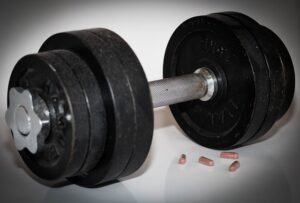Three Facts Professional Dietitians and Bodybuilders Want You to Know
Today, we’re going to unveil three crucial facts that professional dietitians and bodybuilders want you to know. Whether you’re aiming to transform your physique or simply improve your overall health, understanding these key insights will set you on the right path. This way, you will know which one is simply the best mass gainer that will work for you. Now, let’s dig deeper and separate fact from fiction when it comes to protein shakes, post-workout fueling, and enjoying your favorite foods while still building muscle.
Protein Shakes Aren’t Witchcraft Magic for Gaining Muscle Mass
Protein shakes have become almost synonymous with muscle building in the fitness world. Many people believe that simply chugging down a protein shake will magically transform them into a ripped and muscular individual overnight. However, professional dietitians and bodybuilders want you to know that protein shakes are not some kind of mystical elixir.
Building muscle demands a combination of proper nutrition, consistent training, adequate rest, and overall lifestyle choices. In fact, relying solely on protein shakes while neglecting other aspects of your diet can actually hinder your progress. Whole foods like lean meats, poultry, fish, eggs, dairy products, legumes, and nuts offer a wide range of nutrients that contribute to muscle development – not just protein alone.
You Don’t Need Protein Right After Every Workout

As you catch your breath and wipe away the sweat, you may be tempted to reach for that protein shake right away. But here’s a fact that professional dietitians and bodybuilders want you to know: You don’t need protein right after every workout. Contrary to popular belief, no such “magic window” of opportunity should immediately follow your workout.
The idea that you must consume protein within a certain time frame has been debunked by scientific research. While it’s true that protein is vital for muscle repair and growth, the timing of when you consume it doesn’t have as big of an impact as once thought. Instead of obsessing over-consuming protein immediately post-workout, focus on meeting your overall daily protein needs.
Building Muscle Means Saying Goodbye to Your Favorite Foods
We hear and read it often that when building muscle, you can’t indulge in your favorite foods without any consequences. However, professional dietitians and bodybuilders want you to know this is not entirely true. In fact, incorporating your favorite foods into your diet can actually be beneficial for long-term success. It’s all about balance and moderation.
While certain foods may not be as nutrient-dense as others, there is still room for them in a well-rounded diet. The key is to make smart choices and practice portion control. You don’t have to completely eliminate pizza or ice cream from your life – just enjoy them in moderation. This way, you can satisfy your cravings without derailing your progress.
All in all, it pays to focus on consuming adequate amounts of quality protein from whole food sources, prioritize post-workout nutrition without stressing over precise timing, and find balance by allowing yourself occasional indulgences. Trust the experts who know their stuff – professional dietitians and bodybuilders – because they’ve mastered the art of fueling their bodies effectively for optimal performance.…

 One of the best ways to get results quickly is to use the best muscle building supplements. These supplements contain high-quality proteins, vitamins, and minerals that can help you build muscles more quickly. They also provide your body with the necessary energy so that you can complete strenuous workouts without feeling fatigued or exhausted. Be sure to read all labels carefully and consult a doctor before beginning any supplement regimen.
One of the best ways to get results quickly is to use the best muscle building supplements. These supplements contain high-quality proteins, vitamins, and minerals that can help you build muscles more quickly. They also provide your body with the necessary energy so that you can complete strenuous workouts without feeling fatigued or exhausted. Be sure to read all labels carefully and consult a doctor before beginning any supplement regimen.
 It’s important to give your body enough time to rest and recover from your workouts. Resting is when your muscles actually grow, so don’t skimp on sleep. Aim for at least 8 hours of sleep each night to support muscle growth and repair. Following these steps will help you get the results you’re after when it comes to building muscle. Just remember that hard work and dedication are key.
It’s important to give your body enough time to rest and recover from your workouts. Resting is when your muscles actually grow, so don’t skimp on sleep. Aim for at least 8 hours of sleep each night to support muscle growth and repair. Following these steps will help you get the results you’re after when it comes to building muscle. Just remember that hard work and dedication are key. Sleep deprivation has been linked to memory loss, depression, and dementia. When you don’t get enough sleep, your brain’s ability to process information is impaired. When going into a deep sleep, your brain gets a chance to clear out toxins and give it a break from the day. Lack of sleep makes it hard for your brain to rest and can affect its ability to think clearly. Be sure to get at least seven hours of sleep every night so that you can keep your brain healthy and alert.
Sleep deprivation has been linked to memory loss, depression, and dementia. When you don’t get enough sleep, your brain’s ability to process information is impaired. When going into a deep sleep, your brain gets a chance to clear out toxins and give it a break from the day. Lack of sleep makes it hard for your brain to rest and can affect its ability to think clearly. Be sure to get at least seven hours of sleep every night so that you can keep your brain healthy and alert. Last but not least, smoking and drinking can have a major impact on your brain health. Not only can they increase your risk of stroke, but they are both linked to memory problems and cognitive decline. Smoking is particularly damaging because it starves the brain of oxygen, which leads to decreased mental alertness. If you drink alcohol, be sure to do so in moderation.
Last but not least, smoking and drinking can have a major impact on your brain health. Not only can they increase your risk of stroke, but they are both linked to memory problems and cognitive decline. Smoking is particularly damaging because it starves the brain of oxygen, which leads to decreased mental alertness. If you drink alcohol, be sure to do so in moderation.